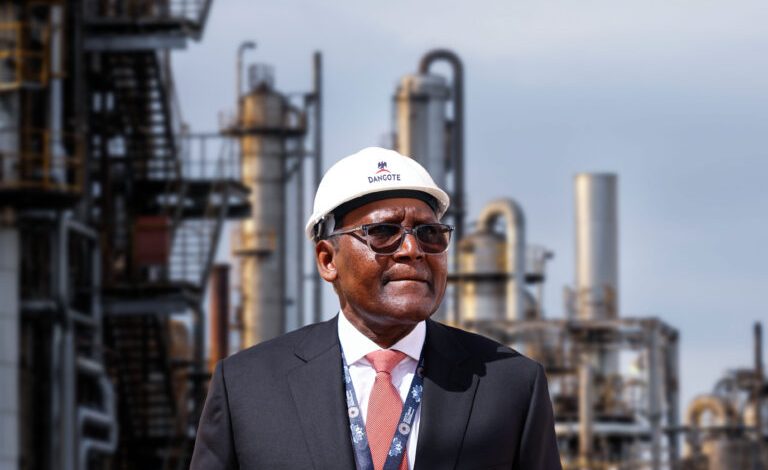
Many observers thought the exchanges between Dangote Refinery and the Nigerian National Petroleum Company Limited (NNPC Ltd) that began a few weeks ago would be a one-off. However, recent developments in the oil and gas industry suggest that this might be the start of a conflict that will benefit no one—except those loyal to their pockets.
The latest episode in this ongoing saga is the back-and-forth between the two parties over the price of Premium Motor Spirit (PMS) refined at the 650,000-barrel-per-day refinery. For the sake of transparency, NNPC Ltd declared that it purchased PMS from the refinery at a rate of N898 per litre, after paying in U.S. dollars. Surprisingly, a few hours after this news made the rounds, Dangote Refinery issued a statement countering the price announced by NNPC Ltd, but curiously omitted details of its actual pricing.
If the company claims that NNPC Ltd provided incorrect figures, the question on everyone’s lips is: how much does Dangote intend to sell its PMS to Nigerians? Unfortunately, the company’s counter-statement failed to provide any answers.
From its inception, Dangote Refinery has been marketed as the final solution to Nigeria’s incessant fuel price hikes and scarcity. According to publicly available data, the price of PMS has risen by over 900 percent in the last 30 years. Yet, Nigerians still endure long queues at stations to get a litre to power their vehicles or generators. In fact, analysts predicted that these issues would become a thing of the past once the multibillion-dollar refinery commenced operations.
Now, the Dangote Refinery is up and running, but the problem persists and may worsen if not handled properly. The refinery has been in a long-running battle with regulators in a bid to edge out competition and dominate the market. The CEO, Aliko Dangote, has launched attacks against PMS importers, accusing them of bringing dirty fuel into the country. However, the fuel produced at Dangote’s refinery reportedly contained harmful levels of sulphur, according to an investigation by POLITICS NIGERIA.
Dangote’s endgame seems to be to drive away competitors and hold Nigerians to ransom as the primary source of PMS in the country. The incentive here is clear: if Dangote becomes the sole supplier to NNPC, it will also become the sole beneficiary of the controversial fuel subsidy payments. On top of that, the company would dictate when and how much Nigerians pay for PMS. Genius.
If this plan succeeds, Nigeria would regress to the dark ages—perhaps even worse than it was twenty years ago. The reasons are obvious. As of September 10, 2024, Nigeria’s daily petrol consumption was 50 million litres, meaning the country needs more than a few trucks from Dangote Refinery to meet its demand.
Already, Dangote Refinery has failed to meet its obligation to supply 25 million litres of fuel to NNPC Ltd, delivering only 16.3 million litres and leaving a shortfall of 8.7 million litres. For perspective, NNPC Ltd mobilised over 300 trucks to transport the fuel and berthed a vessel for the same, but only about 70 trucks have been loaded. This is grossly insufficient and raises serious concerns about whether Nigeria’s energy needs can be met, even with a mega refinery like Dangote’s.
One of the arguments put forward by promoters of the refinery is its potential to help Nigeria conserve scarce foreign exchange. But that purpose will ultimately be defeated if the company insists on being paid in dollars. NNPC Ltd had issued a $120 million Letter of Credit to the refinery to cover the initial supply of 25 million litres, even though the refinery could not meet the agreed amount.
NNPC Ltd plans to start paying for fuel in naira from October, but Dangote Refinery’s disposition toward this arrangement has not been favourable. The company continues to insist on dollar payments, and it remains to be seen how the naira-based system will be implemented.
At present, NNPC Ltd has managed to negotiate the first batch of Dangote fuel to be sold at N950.22 per litre in Lagos, with prices as high as N1,019 per litre in Borno. What will happen next remains uncertain, but if nothing is done to curb the capitalist forces at play, Nigerians may have to brace themselves for even tougher days ahead—far worse than when the country relied solely on imported fuel.
The government and regulatory bodies must navigate these waters carefully. Ensuring that the benefits of local refining reach the populace involves not only monitoring pricing but also maintaining competitiveness in the industry. The public’s interest lies in affordable and accessible fuel, which seems increasingly at odds with the current market dynamics.
